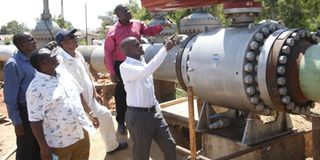Inside KPC’s Sh4bn battle with contractor

Then Kenya Pipeline Managing Director Joe Sang' (right) explaining the effieciency of the newly constructed 450km pipeline connecting Mombasa-Nairobi on October 11, 2017.
What you need to know:
- KPC awarded the project consultancy tender to Shengli Engineering and Consulting Company, a firm whose sister company, Sinopec International Petroleum Services, had lost the pipeline building bid.
- The back-and-forth over designs and approvals from the consultants stretched for months and the bill grew as Kenya Pipeline got drawn into the payment row with its contractor.
Controversy surrounding the multibillion-shilling Mombasa-Nairobi pipeline project has swirled after Kenya Pipeline Company lost its bid to suspend payment of Sh4.4 billion to a Lebanese contractor.
On Tuesday, the Court of Appeal dismissed KPC’s challenge on a High Court ruling by Justice Grace Nzioka in June that directed it to pay the amount within 30 days, pending the resolution of other matters, touching on the construction of the pipeline four years ago.
Behind the court battle between KPC and its contractor, several intrigues continue surrounding the extra payments associated with delays in the completion of the line. Some of these issues stretch back to the tendering process for the Sh48 billion project.
First advertised on January 16, 2013, the tender attracted bids from 40 firms, including 15 from China. Lebanese firm Zakhem International Construction won the contract by beating at least four bidders, a decision that prompted a contest before courts and the Public Procurement Review Board.
KPC awarded the project consultancy tender to Shengli Engineering and Consulting Company, a firm whose sister company, Sinopec International Petroleum Services, had lost the pipeline building bid. Insiders say this is where trouble began.
“The contractor needed to have designs approved by the consultants and could not have proceeded whenever the designs were not ready and this back-and-forth contributed to the delay, which in some cases, was outright deliberate since there were many occasions when the designs provided were just impossible to implement,” an expert involved in the project told the Nation.
Designs and approvals
The back-and-forth over designs and approvals from the consultants stretched for months and the bill grew as Kenya Pipeline got drawn into the payment row with its contractor. Zakhem would later present six claims for the extension that amounted to Sh18.9 billion, throwing the parastatal into a defence mode.
KPC incurred more expenses, including paying a law firm which gave it a legal opinion on the claims and an arbitrator which carried out analysis on four of the agreed EOT claims. Nyara Consult, contracted in December 2017, reduced the claim to Sh4.4 billion, which KPC was to pay subject to board approvals and the Ministry of Mining and Petroleum’s green light.
“The contractor’s main points of claim included delays due to employer’s non-compliance with NCA requirements, impeded approvals and procurement of major plant and equipment, delayed issuance of construction drawings and details, external obstructions along the pipeline delayed availability of pre-commissioning engineering information and change of scope for the works,” the consultants wrote in their assessment report.
KPC was preparing to pay Zakhem Sh4.4 billion to cover the four-year delay of the project, when another obstacle set in. State House had reportedly intervened and blocked the payment and Zakhem had to move to court again.
The Lebanese contractor moved to claim Sh13.26 billion after the payment freeze, including $67 million (Sh6.9 billion) for unpaid works, $59.2 million (Sh6 billion) for delays and $2.6 million (Sh267 million) as interest for delayed payment.
Accruing interest
The October legal fightback followed Petroleum Cabinet Secretary John Munyes’s admission in July, before the Public Investments Committee (PIC), that the Presidency stopped payment to Zakhem pending an independent review of the pipeline construction costs.
According to Zakhem, KPC engineers, executives and the Attorney-General’s office had approved the payments. The delayed payments now add to the accruing interest and may result in further costs on the Sh48 billion pipeline that is still gobbling up public funds, including the latest application to the National Treasury for budgetary approval to install a leak detection system.
KPC seeks to rectify a costly oversight during the construction of the 20-inch pipeline that suffered two major breaches barely a year after it began operations. The contractor says its advice to install the system was ignored.
KPC managing director Irungu Macharia said the firm has made another attempt to install the system, which it had failed to procure in 2018 despite approval of its budget.
“A bidder moved to court to challenge the tender in 2016 and the court ruled in October 2017 that KPC should re-tender. KPC then sought a budget in FY 2018/19 and it was approved, the procurement process did not materialise. KPC then sought budget approval in 2020/21, which is awaiting approval by the Treasury. Once approval is received, KPC will proceed with the procurement process,” Mr Macharia told Senators.




